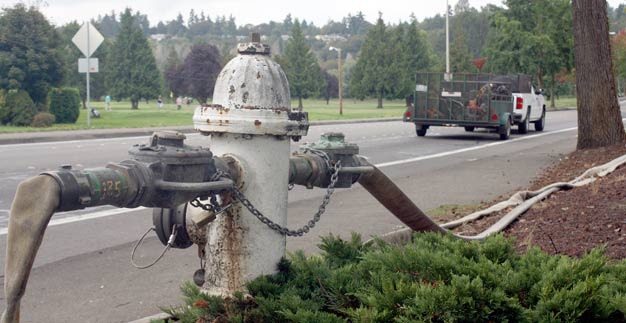It’s going to cost the city of Kent an estimated $400,000 to drill a new irrigation well at the Riverbend Golf Complex.
City officials hoped a few less expensive measures would get the water flowing freely again from the well to water the city-owned 18-hole and par-3 courses, but those efforts failed earlier this year.
“The first step in the spring was to look at rehabbing the well to see if it could produce volume, but that did not work so we need to go to the next step, which is drilling,” City Parks Director Jeff Watling said at an Aug. 27 meeting of the City Council’s Parks and Human Services Committee.
The council already had set aside $400,000 in the 2015-16 budget to cover the potential repair costs after Watling informed members last fall of the ongoing problems with the well.
For the last few years, Riverbend has spent between $100,000 and $150,000 each year to buy water from the city to irrigate the golf courses because of problems with the well. That cost is expected to hit about $160,000 for 2015 as city officials shut down the well because of potential risk of damage to the pump with low water flow.
The water purchased by the golf complex from the city’s water department is supplied by two fire hoses connected to two separate water meters, which are connected to a fire hydrant adjacent to the parking lot at the 18-hole golf course, said Pete Petersen, superintendent of golf operations at Riverbend.
Petersen told the committee about the issues with the well.
“It was drilled 450 feet originally and produced 292 gallons per minute,” Petersen said. “But the Nisqually earthquake in 2001 caused damage and in 2005 the screen got clogged with silt and sand because it became more like jello than soil after the earthquake. The pump works fine for a few minutes but then draws material against the screen and we don’t get any water.”
The city in 2005 drilled down another 100 feet and replaced the well pump. Petersen said that worked fine until 2009 when material again clogged up the system. Staff then used fire hoses to help increase the flow, but could only get about 30 gallons per minute.
The golf complex requires a minimum irrigation water source of 250 gallons per minute to meet the peak irrigation season requirements of the two golf courses, Petersen said. Water from the well is pumped into two ponds located on the 18-hole golf course. Utilizing a separate pump station on the 18-hole course, the water is then dispersed through the irrigation systems of the two courses.
Last spring, more efforts were made to increase the water flow.
“We brought in an expert to look at it, and we determined to try to redevelop the well,” Petersen said. “We attempted it twice in spring, we got 40 gallons then 60, but we need 250 a minute to sustain what the golf course needs.”
The city paid Graham-based Hokkaido Drilling $39,867 for performing the redevelopment attempts of the existing well, Petersen said. The services included the initial test pumping of the existing well, removal of the well pump, removal of the intake pipe and intake screen, cleaning and surging of the well casing, cleaning of the intake pipe and intake screen and final flow testing.
It cost the city another $12,919 to Tacoma-based Robinson Noble for providing hydrogeologic services, testing and analysis, project management of the redevelopment process and additional testing.
As problems with the well continue, city officials are trying to sell the par-3 course to a residential and commercial developer to cover the $2.6 million debt at the complex as well as the nearly $6 million in capital improvements needed on the 18-hole course. The debt is owed to an interfund loan, money that the city borrowed from its water and fleet funds to help pay off the bond for the golf complex.
The city plans to hire Robinson Noble for design work about what it will take to drill a new well and install a new pump or use the existing pump. Watling said he hopes to bring before the council in October or November a bid contract to drill the work and later a second contract for the pump system.
The city’s goal is to have the irrigation well ready by May in order to water the course from May through September. Watling said he might have to ask the council for more money to cover the irrigation costs for 2015.
Councilman Dennis Higgins likes the plan to get the new well drilled, especially since the cost of the new well will cover in just more than two years what the course is paying to buy water from the city for irrigation.
“It’s a good investment,” Higgins said. “A two-year return is fabulous. There is no reason to delay it.”
Talk to us
Please share your story tips by emailing editor@kentreporter.com.
To share your opinion for publication, submit a letter through our website https://www.kentreporter.com/submit-letter/. Include your name, address and daytime phone number. (We’ll only publish your name and hometown.) Please keep letters to 300 words or less.

